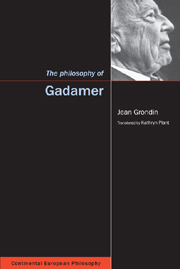Book contents
- Frontmatter
- Contents
- Abbreviations
- Translator's Note
- Introduction
- 1 The Problem of Method and the Project of a Hermeneutics of the Human Sciences
- 2 Truth after Art
- 3 The Destruction of Prejudices in Nineteenth-Century Aesthetics and Epistemology
- 4 Vigilance and Horizon in Hermeneutics
- 5 The Dialogue that We Are
- Conclusion
- Notes
- Bibliography
- Index
2 - Truth after Art
- Frontmatter
- Contents
- Abbreviations
- Translator's Note
- Introduction
- 1 The Problem of Method and the Project of a Hermeneutics of the Human Sciences
- 2 Truth after Art
- 3 The Destruction of Prejudices in Nineteenth-Century Aesthetics and Epistemology
- 4 Vigilance and Horizon in Hermeneutics
- 5 The Dialogue that We Are
- Conclusion
- Notes
- Bibliography
- Index
Summary
The critique of subjectivism in modern aesthetics: the game of art is elsewhere
If we wish to recognize that art has a claim to truth, or better still, to learn what truth is from art, we must above all overcome the Kantian “subjectivization” of aesthetics. For Gadamer, it is a case of the great impasse of aesthetics, if not of the whole of modernism. The vice of modern science is the notion of objectivity that constrains the aesthetic experience to being understood in subjective terms, as if there were no question of its being understood in anything other than spiritual states and the “lived experiences” of the subject. To reduce everything to the level of subjectivity concerned only with itself is to subscribe to the nominalism of modern science. Gadamer's positive and polemical thesis is that the experience of art, on the contrary, remains an experience of being, and even a surfeit of being, to such an extent that subjectivity plays only a secondary role. The vital thing in an adequate ontology of a work of art consists from then on in recognizing that subjectivity is not the master of what happens to people in an aesthetic experience. Think here of Geschehen, of the character of the non-instrumental event, of understanding according to Gadamer, where the advent of art is the first revelation.
How do we describe the aesthetic experience in itself? This question holds a trap, because aesthetic experience is not one that we truly control. We can only properly speak of control in cases where we concentrate on technological development of external nature (where subjectivity can do anything). But, in aesthetic experience, it is we who are captured, rather as if we were taken up by a game.
- Type
- Chapter
- Information
- The Philosophy of Gadamer , pp. 39 - 54Publisher: Acumen PublishingPrint publication year: 2002

